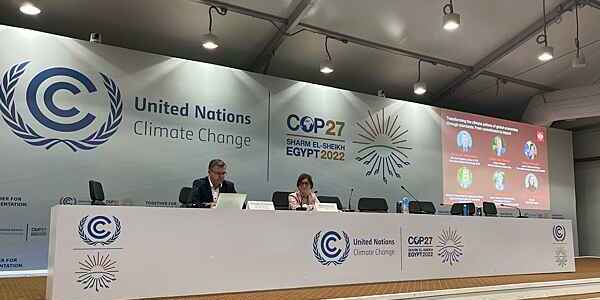Driving climate action through cross-sector collaboration
More ambitious and effective climate policy based on standards is urgently needed.


The 27th Conference of the Parties (COP27) to the UN Framework Convention on Climate Change (UNFCCC) is being held in Sharm El-Sheikh, Egypt, on 6-18 November 2022. ISO and its members join ranks with world change makers to showcase how International Standards help transform climate commitments into action. Our coverage of COP27 provides an overview and greater insights of ISO’s work in this area, from in-depth features to thought-provoking think pieces.
Press release
Standards are the way the world can move from commitment to action for measurable impact, said leading climate and standardization experts at an official COP27 side event, held in Sharm El-Sheikh today, 17 November 2022.
Organized by ISO, the side event created synergies around what is needed to strengthen our commitments into action, including how to improve cross-sector collaboration and accelerate our transition to a low-carbon economy. The session closes off ISO’s two-week participation at COP27 where the landmark Net Zero Guidelines were launched.
Taking urgent action to combat climate change and its devastating impacts is an imperative of ISO and its members. There is already an abundance of standards and policies that can help. What’s lacking is the analysis and coordination of these, the identification of those that are working particularly well and where duplication lies.

Christoph Winterhalter, ISO Vice-President (policy), the session moderator, explained: “We have the foundation, resources and the industry experts to take global action,” he said. “There are already numerous policy tools and standards available that help address climate change mitigation, ensuring greater consistency and providing international benchmarks to increase the impact of any global effort. It is increasingly clear that we don’t need to reinvent the wheel, just realign it.”
Reiterating the importance of standards for policy makers, Roberta Boscolo, Lead of Climate and Energy, World Meteorological Organization (WMO), commented: “International Standards can be an effective policy tool for both adaptation and mitigation of climate change. Their foundation needs to be the best climate data and information in order to be real drivers for climate action.”
Achieving the climate agenda with standards also requires national efforts, said Abeer Sadek from the Egyptian Organization for Standardization and Quality (EOS), ISO member in the country. “In Egypt, we tackle efforts related to harmonizing national standards with the international ones, including those related to the environment and climate action.” Ms Sadek also highlighted the importance of engaging Egyptian stakeholders for achieving the UN SDGs.
Good standardization incorporating high-level principles is essential to the achievement of the UN SDGs and the Paris Agreement, explained Fabienne Michaux, Director, UNDP SDG Impact. We need to place “sustainability and the SDGs at the core of business purpose and value creation,” said Ms Michaux. This should be part of our DNA and how all business is done.
Speaking on behalf of Emanuele Riva, Chair of the IAF, Ann Howard, Senior Director, National Accreditation Board, American National Standards Institute (ANSI), highlighted the need to leverage standards and accredited conformity assessment towards meaningful action on climate change and sustainability. “We hope to continue to be part of the solution to protect the integrity of conformity assessment systems used to support the development and operation of international carbon markets.”
COP27 is the largest annual gathering on climate change that seeks to deliver action on an array of issues critical to tackling the climate crisis. ISO and its members promise to embed key climate considerations into every new standard that is created. They commit to engage with governments, regulators, industry and other major players in the climate space to promote ISO’s standards as preliminary steps towards measurable progress.
Speakers at the event comprised:
- Christoph Winterhalter, ISO Vice President (policy), CEO of Deutsches Institut für Normung (DIN) – moderator
- Roberta Boscolo, Lead of Climate and Energy, World Meteorological Organization (WMO)
- Abeer Sadek, Technical and International Cooperation Director, Egyptian Organization for Standardization and Quality (EOS)
- Ann Howard, Senior Director, National Accreditation Board, American National Standards Institute (ANSI)
- Fabienne Michaux, Director, SDG Impact, United Nations Development Programme (UNDP)